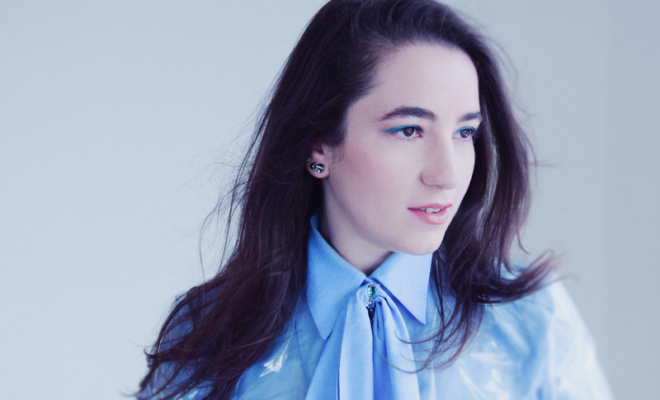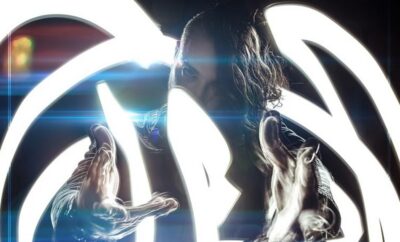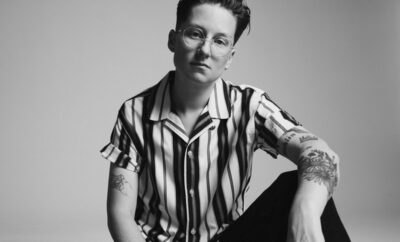 Shervin Lainez
Shervin Lainez
Interviews
Danielle Eva Schwob – Out of the Tunnel
By: Jamie Steinberg
Q) How would you describe your sound?
A) Whatever I am writing, I want it to feel thoughtful and direct. I like melodies and I want to make things that really elicit a deep feeling. I think often what I write comes across as simple, but it’s actually quite complex.
Q) Who are some of your musical influences?
A) On the “composing” front, I would say Arvo Pärt and Stravinsky. For songwriting, Leonard Cohen, Radiohead and Tool.
Q) Your new album Out of the Tunnel is quite a transition from your last album, which was pop. What inspired the change in sound?
A) I guess I don’t think of it as a change in sound, so much as a project that’s in its own separate lane, running alongside my pop writing. I’ve written both “classical” music and pop (for lack of a better word) for years, and am still working on new DELANILA projects, so really this is just something else I’m doing in addition. I actually started work on it around the same time as OVERLOADED and was putting both records together concurrently, which in hindsight was a crazy idea and something I probably won’t do again. In the long run, I’m interested in finding ways to connect the two genres, and so these two records were sort of precursors to that for me. Test runs to learn the ropes. In that way, I don’t even really think of Out of the Tunnel as my second album. It’s more like my second first album, if that makes sense.
Q) Talk about the story behind the new piece and video, “Out of the Tunnel.”
A) Sure. Overall, the piece was inspired by chapters of transformation and deep personal change. That feeling of entering into a challenging time in life, from which you know you will emerge differently—almost like a chrysalis or a metamorphosis or a feeling of climbing out of a dark hole. It’s another project of mine that wound up feeling strangely prescient, given this feeling of “emerging” from the pandemic that I think many in the US are experiencing. I wrote it pre-pandemic though, while imagining driving fast and through tunnels in the literal sense, as I love action movies, and wanted to make something that felt fast and aggressive and dramatic that would work in a dance context. Then, as far as the visuals, the vistas of nature are supposed to be the view at the end of this tunnel. The light up ahead with its peace and trees and clean air. That part may actually have grown partly from my pandemic experience, as time spent in nature proved grounding for me.
Q) How does the video for the track play into the message behind it?
A) Nature for me is the greatest of all psychological reset buttons and the video is inspired by its transformative, regenerative powers and awe-inspiring beauty, which are things that I think are easy to take for granted. James [Mountford], who directed the video, was able to create this extraordinary world of characters searching in the desert—what for, we don’t know, but there’s something about the way they inhabit their surroundings that captures the emotion of the music brilliantly. I am a fan of his work and we had talked about doing something for a while, but it took a moment to find the right project. I’m thrilled it was this one, as the way he captures landscapes and performers is magical, and perfect for the piece. We actually made three more videos for the other movements as well, which I am excited to release.
Q) This composition was commissioned by New Music USA and PUBLIQuartet. How did you get involved in uniting with them?
A) I applied for a grant, along with harpist Ashley Jackson and curator Roya Sachs, for an immersive ballet called Infoxication, which the quartet was part of. We won and the piece was premiered by PUBLIQuartet as part of that show, which featured choreography by Dušan Týnek and was supported additionally by Spring Place and Google. All of the artists involved have known each other through NYC’s “indie-classical” scene for years, but this was the first time we had worked on something of this scale. PUBLIQuartet in particular is a true force of nature and imbued the music with such musicality and excitement. We workshopped it ahead of the premiere so that it would feel tailor-made for their group. Very grateful to them for their work on it, as well as to everyone who supported the project.
Q) How much of hand do you have in the production of your music?
A) There is nothing that goes out with my name on that I don’t have a strong hand in, and production is the same. I’m not a recording engineer, so when it comes to working in the studio, capturing string sounds and so on, I work with collaborators. However, I am extremely active in sessions as a producer, guiding the placement of phrases, dynamics, timing, overall interpretation of the music, as well as making sure we have coverage of the score, communicating with players, etc. I always have a clear idea of how I want things to sound, and a heavy hand in shaping that. That said, I think you get the best results when you have other people involved who have ideas, especially when the music is complex and you have a limited time to record it, and so I love collaborating and co-producing as well, which I did a lot of on this project.
Q) This is your debut full-length album as a composer. What challenged you the most creating it?
A) Everything. Making a record is hard work. Anyone who tells you otherwise is not being entirely truthful. Though more seriously, it was probably the quartet mix. That piece originally had a lot of expansive, cinematic programming which worked very well in a live setting, but just never quite translated to a studio recording. It took a lot of back and forth over different approaches and then ultimately settled more in the acoustic realm, with the electronics playing a supporting role to the live performance. Poor Marc Urselli, who mixed the quartet, had a front row seat on that long exploratory ride. Sorry Marc.
Q) What did you learn about yourself in the process of creating this album?
A) That I need to write music that is easier to play.
Q) What do you hope listeners take away from listening to your album as a whole?
A) I want them to feel transported somewhere and as though they’ve tapped into deeper emotions.
Q) Where are some of your favorite places to perform and what makes those locations so significant to you?
A) I will always have a soft spot for Le Poisson Rouge. They were the first decent-sized venue to take a chance on booking me and have been such an important home for so many musicians in or passing through New York, as well a bastion of this post-genre world we inhabit.
Q) Who would you most like to collaborate with in the future?
A) David Fincher
Q) Why is social media such an important way for you to connect with your fans?
A) Sigh…I have such mixed feelings about this one. It’s an incredible gift to have a platform to present your work in your own words, to stay in touch with anyone interested in it (I don’t like the word fan) and to have control over your own image, but it’s also a relentless time suck. Very easy to tip over into an unhealthy amount of screen time, but equally it is amazing to be able to message directly with people from all over the world about what you are making and to find your tribe. I truly enjoy hearing from and chatting with people.
Q) What would you like to say to everyone who is a fan and supporter of you and your work?
A) Thank you very, very, very, very, very much. It takes a village and I am grateful for everyone who has helped or listened along the way.
Watch The Premiere of “Out of the Tunnel”





You must be logged in to post a comment Login